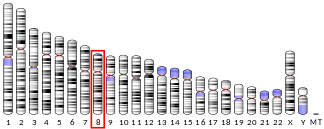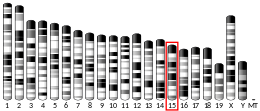PSCA (gene)
| PSCA | |||||||||||||||||||||||||
|---|---|---|---|---|---|---|---|---|---|---|---|---|---|---|---|---|---|---|---|---|---|---|---|---|---|
| Identifiers | |||||||||||||||||||||||||
| Aliases | PSCA, PRO232, prostate stem cell antigen | ||||||||||||||||||||||||
| External IDs | MGI: 1919623 HomoloGene: 4150 GeneCards: PSCA | ||||||||||||||||||||||||
| |||||||||||||||||||||||||
| |||||||||||||||||||||||||
| |||||||||||||||||||||||||
| |||||||||||||||||||||||||
| Orthologs | |||||||||||||||||||||||||
| Species | Human | Mouse | |||||||||||||||||||||||
| Entrez | |||||||||||||||||||||||||
| Ensembl | |||||||||||||||||||||||||
| UniProt | |||||||||||||||||||||||||
| RefSeq (mRNA) | |||||||||||||||||||||||||
| RefSeq (protein) | |||||||||||||||||||||||||
| Location (UCSC) | Chr 8: 142.67 – 142.68 Mb | Chr 15: 74.71 – 74.72 Mb | |||||||||||||||||||||||
| PubMed search | [3] | [4] | |||||||||||||||||||||||
| Wikidata | |||||||||||||||||||||||||
| |||||||||||||||||||||||||
Prostate stem cell antigen is a protein that in humans is encoded by the PSCA gene.[5][6]
This gene encodes a glycosylphosphatidylinositol-anchored cell membrane glycoprotein. In addition to being highly expressed in the prostate it is also expressed in the bladder, placenta, colon, kidney, and stomach. This gene has a nonsynonymous nucleotide polymorphism at its start codon.[6]
Clinical significance
This gene is up-regulated in a large proportion of prostate cancers and is also detected in cancers of the bladder and pancreas.[6]
References
- 1 2 3 GRCh38: Ensembl release 89: ENSG00000167653 - Ensembl, May 2017
- 1 2 3 GRCm38: Ensembl release 89: ENSMUSG00000022598 - Ensembl, May 2017
- ↑ "Human PubMed Reference:".
- ↑ "Mouse PubMed Reference:".
- ↑ Reiter RE, Gu Z, Watabe T, Thomas G, Szigeti K, Davis E, Wahl M, Nisitani S, Yamashiro J, Le Beau MM, Loda M, Witte ON (Mar 1998). "Prostate stem cell antigen: a cell surface marker overexpressed in prostate cancer". Proc Natl Acad Sci U S A. 95 (4): 1735–40. doi:10.1073/pnas.95.4.1735. PMC 19171. PMID 9465086.
- 1 2 3 "Entrez Gene: PSCA prostate stem cell antigen".
Further reading
- Gu Z, Thomas G, Yamashiro J, et al. (2000). "Prostate stem cell antigen (PSCA) expression increases with high gleason score, advanced stage and bone metastasis in prostate cancer". Oncogene. 19 (10): 1288–96. doi:10.1038/sj.onc.1203426. PMID 10713670.
- Bahrenberg G, Brauers A, Joost HG, Jakse G (2000). "Reduced expression of PSCA, a member of the LY-6 family of cell surface antigens, in bladder, esophagus, and stomach tumors". Biochem. Biophys. Res. Commun. 275 (3): 783–8. doi:10.1006/bbrc.2000.3393. PMID 10973799.
- Amara N, Palapattu GS, Schrage M, et al. (2001). "Prostate stem cell antigen is overexpressed in human transitional cell carcinoma". Cancer Res. 61 (12): 4660–5. PMID 11406532.
- Watabe T, Lin M, Ide H, et al. (2002). "Growth, regeneration, and tumorigenesis of the prostate activates the PSCA promoter". Proc. Natl. Acad. Sci. U.S.A. 99 (1): 401–6. doi:10.1073/pnas.012574899. PMC 117572. PMID 11752398.
- Ross S, Spencer SD, Holcomb I, et al. (2002). "Prostate stem cell antigen as therapy target: tissue expression and in vivo efficacy of an immunoconjugate". Cancer Res. 62 (9): 2546–53. PMID 11980648.
- Jain A, Lam A, Vivanco I, et al. (2003). "Identification of an androgen-dependent enhancer within the prostate stem cell antigen gene". Mol. Endocrinol. 16 (10): 2323–37. doi:10.1210/me.2002-0004. PMID 12351697.
- Strausberg RL, Feingold EA, Grouse LH, et al. (2003). "Generation and initial analysis of more than 15,000 full-length human and mouse cDNA sequences". Proc. Natl. Acad. Sci. U.S.A. 99 (26): 16899–903. doi:10.1073/pnas.242603899. PMC 139241. PMID 12477932.
- Tran CP, Lin C, Yamashiro J, Reiter RE (2003). "Prostate stem cell antigen is a marker of late intermediate prostate epithelial cells". Mol. Cancer Res. 1 (2): 113–21. PMID 12496358.
- Clark HF, Gurney AL, Abaya E, et al. (2003). "The secreted protein discovery initiative (SPDI), a large-scale effort to identify novel human secreted and transmembrane proteins: a bioinformatics assessment". Genome Res. 13 (10): 2265–70. doi:10.1101/gr.1293003. PMC 403697. PMID 12975309.
- Ota T, Suzuki Y, Nishikawa T, et al. (2004). "Complete sequencing and characterization of 21,243 full-length human cDNAs". Nat. Genet. 36 (1): 40–5. doi:10.1038/ng1285. PMID 14702039.
- Zhang Z, Henzel WJ (2005). "Signal peptide prediction based on analysis of experimentally verified cleavage sites". Protein Sci. 13 (10): 2819–24. doi:10.1110/ps.04682504. PMC 2286551. PMID 15340161.
- Gerhard DS, Wagner L, Feingold EA, et al. (2004). "The status, quality, and expansion of the NIH full-length cDNA project: the Mammalian Gene Collection (MGC)". Genome Res. 14 (10B): 2121–7. doi:10.1101/gr.2596504. PMC 528928. PMID 15489334.
- Fraga MF, Ballestar E, Villar-Garea A, et al. (2005). "Loss of acetylation at Lys16 and trimethylation at Lys20 of histone H4 is a common hallmark of human cancer". Nat. Genet. 37 (4): 391–400. doi:10.1038/ng1531. PMID 15765097.
- Lam JS, Yamashiro J, Shintaku IP, et al. (2005). "Prostate stem cell antigen is overexpressed in prostate cancer metastases". Clin. Cancer Res. 11 (7): 2591–6. doi:10.1158/1078-0432.CCR-04-1842. PMID 15814638.
- Zhigang Z, Wenlu S (2006). "Complete androgen ablation suppresses prostate stem cell antigen (PSCA) mRNA expression in human prostate carcinoma". Prostate. 65 (4): 299–305. doi:10.1002/pros.20290. PMID 16015594.
- Wente MN, Jain A, Kono E, et al. (2006). "Prostate stem cell antigen is a putative target for immunotherapy in pancreatic cancer". Pancreas. 31 (2): 119–25. doi:10.1097/01.mpa.0000173459.81193.4d. PMID 16024997.
- Oh JH, Yang JO, Hahn Y, et al. (2006). "Transcriptome analysis of human gastric cancer". Mamm. Genome. 16 (12): 942–54. doi:10.1007/s00335-005-0075-2. PMID 16341674.
- Grubbs EG, Abdel-Wahab Z, Tyler DS, Pruitt SK (2007). "Utilizing quantitative polymerase chain reaction to evaluate prostate stem cell antigen as a tumor marker in pancreatic cancer". Ann. Surg. Oncol. 13 (12): 1645–54. doi:10.1245/s10434-006-9029-5. PMID 16957968.
- Morgenroth A, Cartellieri M, Schmitz M, et al. (2007). "Targeting of tumor cells expressing the prostate stem cell antigen (PSCA) using genetically engineered T-cells". Prostate. 67 (10): 1121–31. doi:10.1002/pros.20608. PMID 17492652.
This article is issued from
Wikipedia.
The text is licensed under Creative Commons - Attribution - Sharealike.
Additional terms may apply for the media files.




